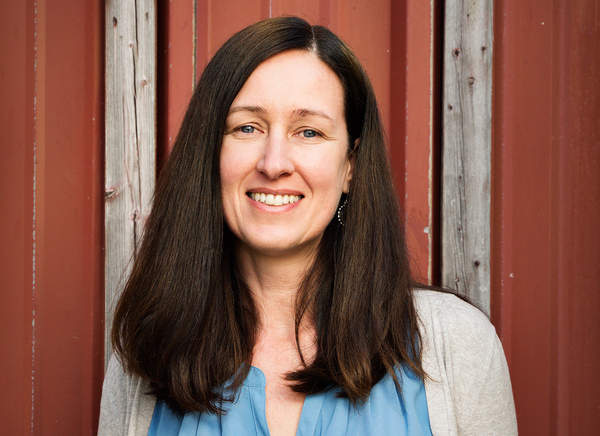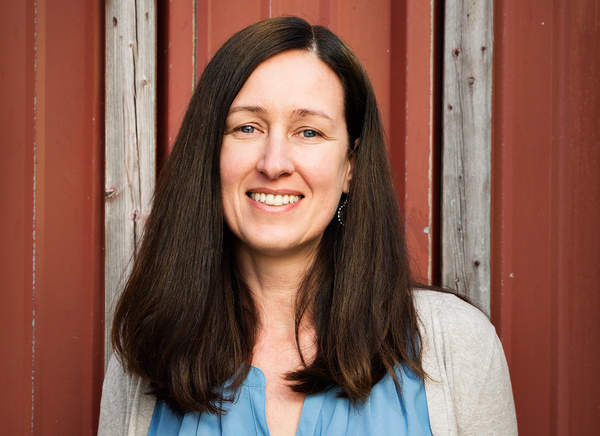
Gov. Janet Mills has nominated the head of Maine Farmland Trust to serve as commissioner of the Maine Department of Agriculture, Conservation and Forestry.
If confirmed by the Maine Senate, Amanda Beal will lead a large state agency that oversees farming programs, state parks and public lands, the Maine Forest Service and a broad range of other programs. Beal grew up on a dairy farm in Litchfield and has been active on food policy issues. She also has ties to the conservation community, currently serving as president and CEO of the Maine Farmland Trust, a nonprofit that works to protect farms from development.
“Amanda has dedicated much of her career to supporting Maine’s agricultural economy and bolstering conservation efforts across the state,” Mills said in a statement. “Her wealth of knowledge, experience, and skills will be a valuable asset to the people of Maine as she undertakes the role of leading the Department of Agriculture, Conservation and Forestry.”
“I know that Amanda will build a team of intelligent people who are good listeners and who have common-sense and a bit of dirt under their nails so that we can bring together the diverse and equally important interests overseen by this department and ensure that everyone gets a fair shake from state government,” Mills said.
Related:
New leader of Maine Farmland Trust has firsthand experience
DEBATE BREWS OVER SPLITTING MAINE’S AGRICULTURE, CONSERVATION DEPARTMENT
Beal is the last of the 14 commissioner nominees for Mills’ Cabinet, all of whom will be subject to legislative committee hearings and a Senate confirmation vote before they become official. Beal also is the eighth woman selected by Mills – Maine’s first female governor – to head a state agency, numbers that would make the Mills administration the most gender-diverse in state history if all are confirmed by the Senate.
The 46-year-old Beal would take over an agency that serves diverse farming interests, from large potato farms in Aroostook County to the small, organic farms that have helped Maine buck the national trend of dwindling farms and aging farmers. She also co-authored the book “A New England Food Vision,” which studied the potential for expanding food production throughout the region.
Since 2012, the department also has overseen state parks, outdoor recreation programs and a multi-billion dollar forestry industry that still forms the economic backbone in parts of rural Maine. The breadth of the department’s mission – combined with the expectations among those sectors to have their interests given top priority – complicated Mills’ selection of a person able to work across various sectors.
Rep. Craig Hickman, a Winthrop organic farmer who co-chairs the Legislature’s Agriculture, Conservation and Forestry Committee, called Beal “another bold nomination” for Mills. Hickman said he first met Beal years ago as they talked about food policy for the state over a home-cooked dinner.
“It’s been a long time coming for us to have a expert on food policy to lead the department,” Hickman said. “And during the confirmation hearings, I look forward to discussing her vision for a robust food economy, moving Maine toward food self-sufficiency and sustainability, and how she plans to strengthen our heritage industries and protect our natural resources throughout the state.”
Adding to the State House intrigue, some lawmakers and interest groups would like to break up the department into smaller parts. Former Gov. Paul LePage merged the Department of Agriculture, Food and Rural Resources with the Department of Conservation roughly seven years ago.
Mills has been lukewarm to reversing the consolidation, and Beal did not address whether to dismantle the agency she was tapped to lead.
“To a large degree, our state is characterized by the intersection of agriculture, conservation and forestry, and, to that end, I believe it is up to this department to lead the state’s efforts to maintain that brand, our way of life, and our culture,” Beal said in a statement. “Ensuring that these sectors thrive is not only necessary for the economic health of our state, but for sustaining many of the essential qualities that define Maine.”
While Beal grew up on a dairy farm, she’s not the traditional farmer that some in Maine’s agriculture community wanted in the department commissioner and it was unclear Friday whether Beal will face opposition during her confirmation process.
“Maine Farm Bureau supports all agriculture: beginning farmers to multi-generational farms, conventional and organic, diversified and specialty crop farms,” Julie Ann Smith, executive director of the Maine Farm Bureau, said in an email. “We recognize the vital importance for the next Commissioner of DACF to promote a positive future for all agriculture in Maine, and look forward to our continued work with the Department.”
Beal has served as president and CEO of Maine Farmland Trust since 2016 and has previously worked on agriculture policy, as a researcher and as manager of a retail food store. Additionally, Beal has headed the board of directors at the Maine Organic Farmers and Gardeners Association, or MOFGA, as well as the Eat Local Foods Coalition of Maine.
The nomination drew praise from conservation groups as well as MOFGA’s executive director, Sarah Alexander, who called Beal “the ideal person to lead the department.”
“She’s the whole package,” Alexander said. “Having grown up on a Maine dairy farm family, she understands the challenges facing farmers and foresters, she has extensive experience in the conservation community, she is smart, articulate, thoughtful, and an excellent listener. She has worked tirelessly to help create a vision and a plan for Maine’s agricultural future, and I know that she will work with everyone in the agricultural community to chart a path forward.”
Patrick Strauch, executive director of the Maine Forest Products Council, said he looked forward to meeting Beal “and talking with her about the magnitude of Maine’s forest economy,” which is an $8 billion industry in the state.
“We are competing in a global marketplace and have more than 33,000 direct and indirect jobs in the forest products industry, mostly in the rural areas of Maine,” Strauch said. “We are entering a period of growth and looking for strong state leadership and support from the administration.”

